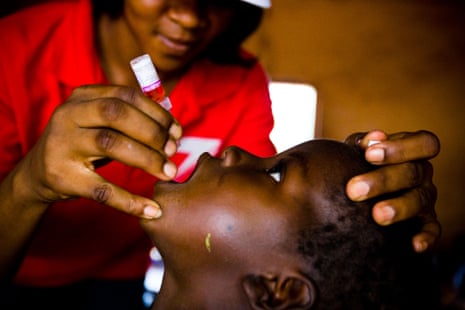More than 23 million young children across southern Africa will be offered vaccinations against wild polio after an outbreak of the virus was detected in Malawi for the first time since 1992.
Children under five in Lilongwe, Malawi’s capital, began to be immunised on Sunday as part of a mass drive against the disease.
Over the next four months, vaccines will be offered to children across the country and in Mozambique, Tanzania, Zambia and Zimbabwe.
Last month, Malawi recorded the first case of wild polio in 30 years, and the first in Africa since the region was certified free of indigenous wild poliovirus in 2020. So far only one case has been detected in Lilongwe.
There are three variants of wild or naturally occurring virus, which is the most common type of polio. Two types have been eradicated (WPV2 and WPV3), while WPV1 only remains endemic in Pakistan and Afghanistan. There is also a very rare vaccine-derived poliovirus, which is a variant of the weakened poliovirus initially included in the oral polio vaccine.
“In support of Malawi and its neighbours, we are acting fast to halt this outbreak and extinguish the threat through effective vaccinations,” said Dr Matshidiso Moeti, regional director for Africa at the World Health Organization, which is supporting the vaccine campaign.
“The African region has already defeated wild poliovirus due to a monumental effort by countries. We have the knowhow and are tirelessly working to ensure that every child lives and thrives in a continent free of polio.”
Dr Randy Mungwira, WHO deputy incident manager for polio response in Malawi, told the Guardian his team had “meticulously planned” to contact every child in the country. He said the recent outbreak was a threat to previous efforts to eradicate the disease.
“We want to make sure that our children are protected from this,” he said. “We do not want to see children paralysed from polio in the next few years. We want to stop that.”
The country has set up 11 surveillance sites in four cities: Lilongwe, Blantyre, Mzuzu and Zomba. Malawi’s health minister, Khumbize Kandodo Chiponda, said the government had set up emergency committees at national and district levels to monitor cases and assess the risk of the virus spreading.
The WHO said the region’s certification as free of wild polio remained unchanged. Laboratory analysis linked the WPV1 variant detected in Malawi to one circulating in Pakistan’s Sindh province in 2019.
